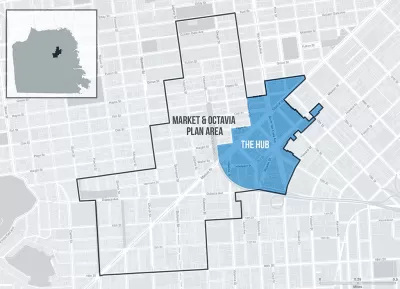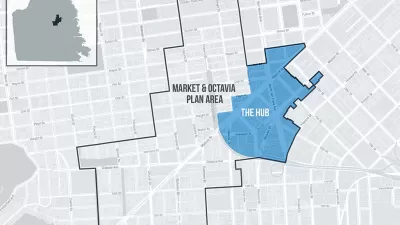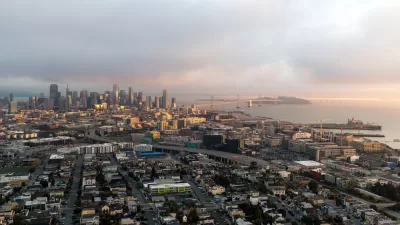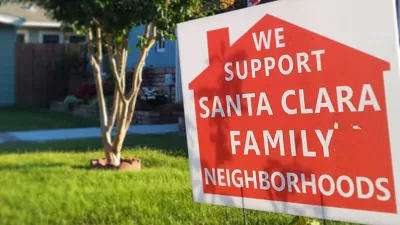Checking in with The Hub, a proposed rezoning that would enable a multi-parcel redevelopment at a conspicuous intersection, two years after the city paused the rezoning for additional analysis (spoiler alert: the analysis hasn’t even started).

San Francisco Chronicle Columnist Heather Knight [paywall] provides an update on the planning for a controversial redevelopment project known as “The Hub,” located on a collection of parcels at the intersection of two of San Francisco’s most prominent streets—Van Ness and Market.
“Planning officials have long wanted to rezone the area, dubbed the Hub, to allow taller, denser apartment buildings in an area well-suited for them and in a city that famously needs them. The housing would be near transit, and the projects would create union jobs while not displacing any residents,” explains Knight.
Back in July, the San Francisco Board of Supervisors decided to pause the plan to perform a race ad equity analysis for the project, part of a deal that allowed three nearby projects to move forward. According to Knight’s account of the episode, Supervisor Dean Preston, a popular target for California YIMBYs, pushed for the analysis. “Preston said the city should get input from the nearby Western Addition neighborhood, where Black residents have notoriously been pushed aside by land development,” writes Knight.
Racial impact and equity analyses are becoming a more popular, common planning tool, implemented in various forms in New York City, Seattle, and Northeast Ohio, for example. In San Francisco, it seems that the practice is mostly for show.
“TODCO, the powerful affordable housing organization run by John Elberling, was set to complete the study on its own dime,” reports Knight. “Two years and one month later, the study hasn’t begun. In fact, Elberling told me this week, he’s not going to do the study. He blamed a number of issues, including the pandemic — though the virus was in full swing when he agreed to conduct the study — and a consulting group that said it would help but didn’t.”
Meanwhile zero progress has been made on a project that would contribute significant numbers of housing to a city with a mandate to build 82,000 new units by 2031 through the state Regional Housing Needs Assessment process.
Planetizen also picked up news about the city's plans to rezone the site of The Hub in 2017.
FULL STORY: The latest S.F. housing failure: Thousands of units delayed for a study that never happened

Planetizen Federal Action Tracker
A weekly monitor of how Trump’s orders and actions are impacting planners and planning in America.

Maui's Vacation Rental Debate Turns Ugly
Verbal attacks, misinformation campaigns and fistfights plague a high-stakes debate to convert thousands of vacation rentals into long-term housing.

Restaurant Patios Were a Pandemic Win — Why Were They so Hard to Keep?
Social distancing requirements and changes in travel patterns prompted cities to pilot new uses for street and sidewalk space. Then it got complicated.

In California Battle of Housing vs. Environment, Housing Just Won
A new state law significantly limits the power of CEQA, an environmental review law that served as a powerful tool for blocking new development.

Boulder Eliminates Parking Minimums Citywide
Officials estimate the cost of building a single underground parking space at up to $100,000.

Orange County, Florida Adopts Largest US “Sprawl Repair” Code
The ‘Orange Code’ seeks to rectify decades of sprawl-inducing, car-oriented development.
Urban Design for Planners 1: Software Tools
This six-course series explores essential urban design concepts using open source software and equips planners with the tools they need to participate fully in the urban design process.
Planning for Universal Design
Learn the tools for implementing Universal Design in planning regulations.
Heyer Gruel & Associates PA
JM Goldson LLC
Custer County Colorado
City of Camden Redevelopment Agency
City of Astoria
Transportation Research & Education Center (TREC) at Portland State University
Jefferson Parish Government
Camden Redevelopment Agency
City of Claremont





























